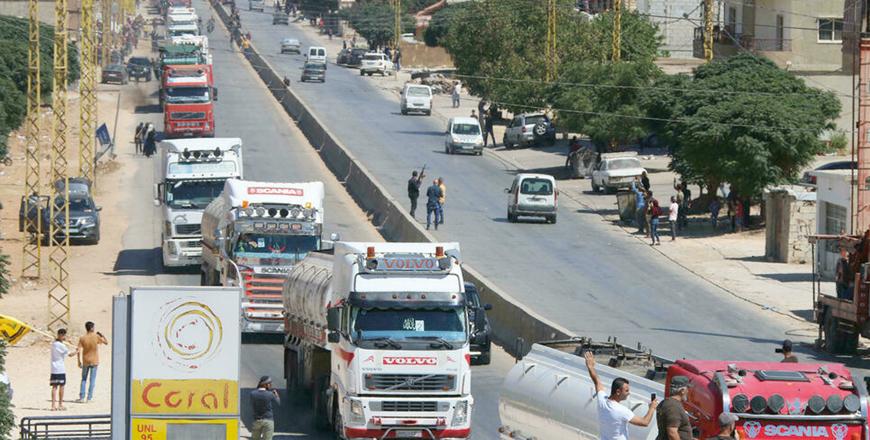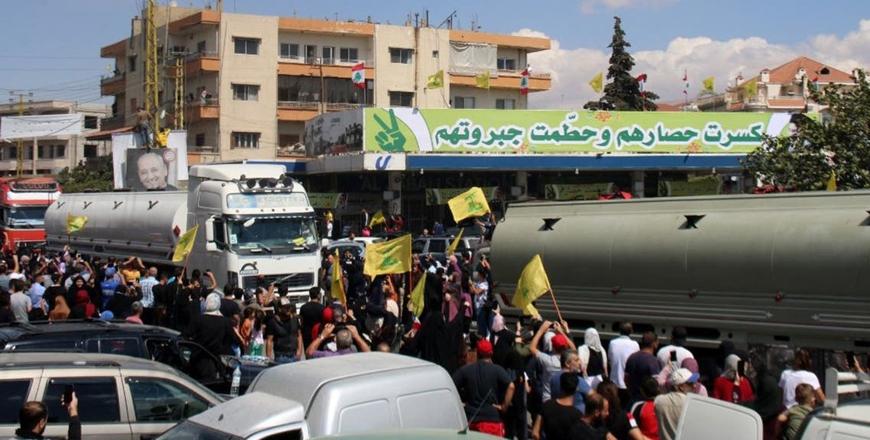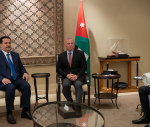You are here
Sourcing fuel, Hizbollah cements role as Lebanon’s real ruler
By AFP - Sep 20,2021 - Last updated at Sep 20,2021

Tankers arrive in eastern Lebanon’s Bekaa Valley carrying fuel from Iran (AFP photo)
BEIRUT — Iranian fuel has entered Lebanon without state authorisation and despite US sanctions following arrangements by Shiite group Hizbollah, consecrating the party’s status as the main powerhouse in the crisis-hit country.
“This latest event gives yet another confirmation that Hizbollah has considerably increased its sway over the Lebanese state,” said political scientist Karim Emile Bitar.
“It is no longer even trying to hide behind the veneer of legality offered by official institutions,” he said.
Lebanon, grappling with its worst-ever financial crisis, defaulted on its debt last year and can no longer afford to import key goods, including petrol for vehicles and diesel for generators during almost round-the-clock power cuts.
Fuel shortages have forced motorists to queue for hours — sometimes days — while electricity outages have plunged the country into darkness, paralysing hospitals, schools and government offices.
Despite being an integral part of the state — it holds seats in parliament and backs several Cabinet ministers — Hizbollah has bemoaned the state’s failure and vowed to step in with its own solution.
The party, which is designated by the US as a terrorist group and is the only militia to have kept its arsenal after Lebanon’s 1975-1990 war, arranged for dozens of trucks carrying Iranian fuel to enter Lebanon via Syria last week.
The delivery was not officially approved by the government and the trucks entered via an illegal crossing for a transaction that violates US and other sanctions.
The move, although a first, falls in line with the Iran-backed party’s long-standing autonomy from a weak centralised state that has stood idly on the sidelines as the group deployed in Syria in 2013 and repeatedly engaged in military confrontations with southern neighbour Israel.
“Hizbollah’s latest move weakens the state and perceptions of the state,” political activist and energy expert Laury Haytayan told AFP.
“It’s very clear that the state is unable to stop Hizbollah. The state is watching and it’s paralysed and it can’t take any action.”
‘Violation of sovereignty’
A total of 80 trucks carrying 4 million litres of Iranian fuel oil entered Lebanon on Thursday, days after a first Iranian ship reached the Syrian port of Baniyas.
Three more Iranian ships are expected to deliver fuel oil and petrol in the coming weeks, according to Hizbollah chief Hassan Nasrallah.
The shipments were purchased by Lebanese businessmen, according to Iran, most likely with ties to Hizbollah.
The Lebanese government, headed by Prime Minister Najib Mikati and which was finally formed last week after a year-long delay, has distanced itself from the scheme.
Speaking to CNN last week, Mikati described the Hizbollah delivery as “a violation of Lebanese sovereignty” but said he believed Lebanon would not be hit by US sanctions because the government had not authorised the shipment.
The first fuel delivery — which Hizbollah’s Al Manar TV says can only cover the needs of a single major institution such as a hospital for one month — is a “test”, Haytayan said.
If it goes unanswered by the US, then many traders may be emboldened to stock up despite the threat of sanctions, especially if shortages persist, the expert said.
Distribution
Fuel distribution will be managed by Hizbollah auxiliaries that are already sanctioned and run no additional risk.
Al Amana, a fuel distribution company which is owned by Hizbollah and has been under US sanctions since February 2020, distributed a first batch of around 100,000 litres of fuel oil in the southern Hizbollah stronghold of Tyre and Beirut on Saturday, Al Manar reported, without specifying the exact beneficiaries.
On Sunday, Al Amana distributed another 100,000 litres of fuel oil in Mount Lebanon and the eastern Bekaa Valley which is widely considered a Hizbollah bastion, Al Manar said.
The first deliveries were all free of charge after Nasrallah on Monday said his group would donate fuel to government hospitals, nursing homes, orphanages, water pumping stations, municipalities, civil defence units, firefighter brigades and the Lebanese Red Cross.
The rest will be sold on the market in Lebanese pounds at a price less than the subsidised rate set by the state, Al Amana said on Sunday, making it a serious competitor for official importers selling stocks in US dollars at a much higher price.
Nasrallah said last week he hopes municipalities will oversee distribution.
But he stressed individual institutions could also source fuel directly from Hizbollah if a particular municipality refuses to engage with it for political reasons.
Dispelling rumours that the fuel will only benefit Hizbollah’s own community, Nasrallah said it was intended “for all regions and for all Lebanese” regardless of their political or sectarian affiliation.
Related Articles
TEHRAN — Iran said on Sunday it is willing to sell fuel to Lebanon’s government to help ease shortages, days after a first delivery of Irani
BEIRUT — Hizbollah chief Hassan Nasrallah said on Thursday a tanker would set off from Iran imminently to bring desperately needed
BEIRUT — The head of Hizbollah in Lebanon on Sunday promised that deliveries of Iranian fuel would arrive "in the days to come" to help solv

















